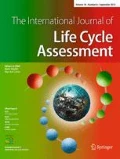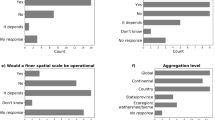Abstract
Purpose
Bottom-up–based life cycle assessment (LCA) approaches are used to assess the greenhouse gas emissions of various products such as transportation fuels. Bottom-up spreadsheet–based models include numerous calculations and assumed values that are uncertain. Currently, most LCAs provide point estimates with a simple one-at-a-time sensitivity analysis, which provides limited insight into how the model assumptions affect the results. Additionally, the LCA models are generally presented with a limited number of scenarios to avoid overwhelming the reader; however, this limits the usefulness of the work, as each reader will be interested in different scenarios. The goal of this work is to use a global sensitivity and regression to provide as much information to the reader as possible in an easily digestible form.
Methods
The Morris and Sobol global sensitivity methods are examined to determine if they can accurately identify the key inputs that have the largest effect on overall output variance. A multiparameter linear regression is then used to simplify the model into a single equation. Rstudio and Excel VBA are used to create an easy-to-use template called the Regression, Uncertainty, and Sensitivity Tool (RUST) that can be inserted into any Excel-based LCA model. This method is applied to the previously published FUNdamental ENgineering PrinciplEs-based ModeL for Estimation of GreenHouse Gases in Conventional Crude Oils and Oil Sands (FUNNEL-GHG-CCO/OS) as an example case.
Results and discussion
Both the Morris and Sobol methods can identify the key parameters, but the Morris method requires less than 1/100th as many model evaluations. Of the model’s 65 parameters, 14 key parameters were identified. The corresponding regression model was found to have an accuracy of ± 0.5 g CO2 eq/MJ 90% of the time and a maximum error of + 3 and − 1 g CO2 eq/MJ.
Conclusions
This work found that the Morris method can be used to screen key parameters and that a stepwise multiparameter linear regression approach can be used to develop a simplified version of the model. The developed RUST Excel workbook can be used to perform the sensitivity and regression analysis of any Excel-based LCA models. The regression model can then be easily published, it does not require a large effort to make a user friendly version of the model, and it conceals confidential data if necessary. The simplified model makes it easy for policy markets to investigate how changes in critical parameters affect the LCA results without having to learn how to use the full complex model.










Similar content being viewed by others
References
Argonne (2015) GREET1. Argonne National Laboratory. https://greet.es.anl.gov/. Accessed June 14, 2016.
Campolongo F, Braddock R (1999) Sensitivity analysis of the IMAGE Greenhouse model. Environ Model Softw 14:275–282
Campolongo F, Cariboni J (2007) Sensitivity analysis: how to detect important factors in large models. Office for Official Publications of the European Communities, Luxembourg
Campolongo F, Cariboni J, Saltelli A (2007) An effective screening design for sensitivity analysis of large models. Environ Model Softw 22:1509–1518
Carnell R (2016) lhs: Latin hypercube samples. https://cran.r-project.org/package=lhs. Accessed Dec. 14, 2017.
Carnell R (2017) triangle: provides the standard distribution functions for the triangle distribution. https://cran.r-project.org/package=triangle. Accessed Dec. 14, 2017.
Chouldechova A (2017) Regression diagnostic plots. Carnegie Mellon University. https://www.andrew.cmu.edu/user/achoulde/94842/homework/regression_diagnostics.html. Accessed Sept. 13, 2017.
Chrisman L (2014) Latin hypercube vs. Monte Carlo sampling. Lumina. http://www.lumina.com/blog/latin-hypercube-vs.-monte-carlo-sampling. Accessed July 13, 2017.
Di Lullo G, Zhang H, Kumar A (2016) Evaluation of uncertainty in the well-to-tank and combustion greenhouse gas emissions of various transportation fuels. Appl Energy 184:413–426
Di Lullo G, Zhang H, Kumar A (2017) Uncertainty in well-to-tank with combustion greenhouse gas emissions of transportation fuels derived from North American crudes. Energy 128:475–486
Ferretti F, Saltelli A, Tarantola S (2016) Trends in sensitivity analysis practice in the last decade. Sci Total Environ 568:666–670
Frost J (2012) Regression smackdown: stepwise versus best subsets! The Minitab Blog. http://blog.minitab.com/blog/adventures-in-statistics-2/regression-smackdown-stepwise-versus-best-subsets. Accessed Sept. 13, 2017.
Frost J (2013) What are the effects of multicollinearity and when can I ignore them? The Minitab Blog. http://blog.minitab.com/blog/adventures-in-statistics-2/what-are-the-effects-of-multicollinearity-and-when-can-i-ignore-them. Accessed May 2, 2013.
Frost J (2015) The danger of overfitting regression models. The Minitab Blog. http://blog.minitab.com/blog/adventures-in-statistics-2/the-danger-of-overfitting-regression-models. Accessed Sept. 3, 2015.
Frost J (2017) Overfitting regression models: problems, detection, and avoidance. Statistics by Jim. http://statisticsbyjim.com/regression/overfitting-regression-models/. Accessed May 26, 2017.
Gan Y et al (2014) A comprehensive evaluation of various sensitivity analysis methods: A case study with a hydrological model. Environ Model Softw 51:269–285
Gordon D, Brandt A, Bergerson J, Jonathan K (2015) Know your oil: creating a global oil-climate index. Carnegie Endowment for International Peace. http://carnegieendowment.org/files/know_your_oil.pdf. Accessed Feb. 18, 2016.
GreenDelta (2018) OpenLCA.
Groen EA, Bokkers EAM, Heijungs R, de Boer IJM (2017) Methods for global sensitivity analysis in life cycle assessment. Int J Life Cycle Assess 22:1125–1137
Grothendieck G (2013) nls2: non-linear regression with brute force. https://cran.r-project.org/package=nls2. Accessed Dec. 14, 2017.
Hadley Wickham JH, Romain Francois, Jukka Jylänki, Mikkel Jørgensen (2017) readr: read rectangular text data. https://cran.r-project.org/package=readr. Accessed Dec. 14, 2017.
Heaps CG (2016) Long-range Energy Alternatives Planning (LEAP) system. Stockholm Environment Institute. https://www.energycommunity.org. Accessed June 14, 2018.
Igos E, Benetto E, Meyer R, Baustert P, Othoniel B (2019) How to treat uncertainties in life cycle assessment studies? Int J Life Cycle Assess 24:794–807
Ihaka R (2007) Quantiles and quantile based plots. The University of Auckland. https://www.stat.auckland.ac.nz/~ihaka/787/lectures-quantiles.pdf. Accessed Sept. 13, 2017.
Iooss B, Lemaître P (2015) A review on global sensitivity analysis methods. In: Dellino G, Meloni C (eds) Uncertainty management in simulation-optimization of complex systems: algorithms and applications. Springer US, Boston, MA, pp. 101–122.
ISO (2006a) ISO 14040:2006: environmental management - life cycle assessment - principles and framework.
ISO (2006b) ISO 14044:2006: environmental management - life cycle assessment - requirements and guidelines.
Keesom B, Blieszner J, Unnasch S (2012) EU pathway study: life cycle assessment of crude oils in a European context. Jacobs Consultancy. http://www.energy.alberta.ca/Oil/pdfs/OSPathwayStudyEUjacobsRept2012.pdf. Accessed June 14, 2016.
Keesom W, Unnasch S, Moretta J (2009) Life cycle assessment comparison of North American and imported crudes prepared for Alberta Energy Research Institute. Jacobs Consultancy. http://www.eipa.alberta.ca/media/39640/life%20cycle%20analysis%20jacobs%20final%20report.pdf. Accessed Feb. 18, 2016.
Koenker R, Portnoy S, Ng PT, Zeileis A, Grosjean P, Ripley BD (2017) quantreg: quantile regression. https://cran.r-project.org/package=quantreg. Accessed Dec. 14, 2017.
Mathworks (2018) MATLAB. Mathworks. https://www.mathworks.com/products/matlab.html. Accessed Feb. 14, 2019.
Microsoft Support (2017) Memory usage in the 32-bit edition of Excel 2013 and 2016. https://support.microsoft.com/en-ca/help/3066990/memory-usage-in-the-32-bit-edition-of-excel-2013-and-2016. Accessed Feb. 2, 2019.
Minitab Inc. (2017) What is partial least squares regression? Minitab Inc.,. https://support.minitab.com/en-us/minitab/18/help-and-how-to/modeling-statistics/regression/supporting-topics/partial-least-squares-regression/what-is-partial-least-squares-regression/. Accessed Feb. 14, 2019.
Morris MD (1991) Factorial sampling plans for preliminary computational experiments. Technometrics 33:161–174
Myhre G et al (2013) Anthropogenic and natural radiative forcing. Cambridge University Press, Cambridge and New York
Nimana B, Canter C, Kumar A (2015a) Energy consumption and greenhouse gas emissions in the recovery and extraction of crude bitumen from Canada’s oil sands. Appl Energy 143:189–199
Nimana B, Canter C, Kumar A (2015b) Energy consumption and greenhouse gas emissions in upgrading and refining of Canada’s oil sands products. Energy 83:65–79
Nimana B, Canter C, Kumar A (2015c) Life cycle assessment of greenhouse gas emissions from Canada’s oil sands-derived transportation fuels. Energy 88:544–554
Olejnik S, Mills J, Keselman H (2000) Using Wherry’s adjusted R2 and Mallow’s Cp for model selection from all possible regressions. J Exp Educ 68:365–380
Oracle (2019) Crystal ball. https://www.oracle.com/ca-en/applications/crystalball/. Accessed Feb. 14, 2019.
Pedroni N, Zio E (2012) Empirical comparison of methods for the hierarchical propagation of hybrid uncertaintly in risk assessment, in presence of dependencies. Int J Uncertainty Fuzziness Knowledge Based Syst 20:509–557
Pianosi F, Wagener T (2015) A simple and efficient method for global sensitivity analysis based on cumulative distribution functions. Environ Model Softw 67:1–11
Pré Consultants BV (2019) SimaPro. https://simapro.com/. Accessed Feb. 14, 2019.
Pujol G et al. (2017) sensitivity: global sensitivity analysis of model outputs. https://cran.r-project.org/package=sensitivity. Accessed Dec. 14, 2017.
R Core Team and contributors worldwide (2017) The R Stats Package. https://stat.ethz.ch/R-manual/R-devel/library/stats/html/00Index.html. Accessed Dec. 14, 2017.
Rabitz H (2010) Global sensitivity analysis for systems with independent and/or correlated inputs. Procedia Soc Behav Sci 2:7587–7589
Rahman MM, Canter C, Kumar A (2014) Greenhouse gas emissions from recovery of various North American conventional crudes. Energy 74:607–617
Rahman MM, Canter C, Kumar A (2015) Well-to-wheel life cycle assessment of transportation fuels derived from different North American conventional crudes. Appl Energy 156:159–173
Regis Pouillot M-LD-M, Jean-Baptiste Denis (2017) mc2d: tools for two-dimensional Monte-Carlo simulations. https://cran.r-project.org/package=mc2d. Accessed Dec. 14, 2017.
Rosenfeld J, Pont J, Law K, Hirshfeld D, Kolb J (2009) Comparison of North American and imported crude oil lifecycle GHG emissions - final report prepared for Alberta Energy Reseach Institute. TIAX LLC. http://eipa.alberta.ca/media/39643/life%20cycle%20analysis%20tiax%20final%20report.pdf. Accessed Mar. 25, 2016.
Ross S, Evans D, Webber M (2002) How LCA studies deal with uncertainty. Int J Life Cycle Assess 7:47
Saltelli A, Tarantola S, Campolongo F, Ratto M (2004) Sensitivity analysis in practice: a guide to assessing scientific models. John Wiley & Sons Ltd., West Sussex, England
SIMLAB (2016) SIMLAB. European Union Science HUB. https://ec.europa.eu/jrc/en/samo/simlab. Accessed Feb. 14, 2019.
Sobol IM (1993) Sensitivity estimates for nonlinear mathematical models. Math Model Comput Exp 1:407–414
Suh S, Qin Y (2017) Pre-calculated LCIs with uncertainties revisited. Int J Life Cycle Assess 22:827–831
thinkstep (2019) GaBi Product Sustainability Software. http://www.gabi-software.com/canada/software/gabi-software/. Accessed Feb. 14, 2019.
Venables B, Hornik K, Maechler M (2016) polynom: a collection of functions to implement a class for univariate polynomial manipulations. https://CRAN.R-project.org/package=polynom. Accessed Feb. 14, 2019.
Vose D (2019) ModelRisk Vose Software. https://www.vosesoftware.com/products/modelrisk/. Accessed Feb. 14, 2019.
Walker WE, Harremoës P, Rotmans J, van der Sluijs JP, van Asselt MBA, Janssen P, Krayer von Krauss MP (2003) Defining uncertainty: a conceptual basis for uncertainty management in model-based decision support. Integr Assess 4:5–17
Wickham H, Chang W (2016) ggplot2: create elegant data visualisations using the grammar of graphics. https://cran.r-project.org/package=ggplot2. Accessed Dec. 14, 2017.
Acknowledgments
The authors thank Astrid Blodgett for editorial assistance.
Funding
NSERC/Cenovus/Alberta Innovates Associate Industrial Research Chair in Energy and Environmental Systems Engineering and the Cenovus Energy Endowed Chair in Environmental Engineering provided financial support for this project. Support was also given by the Natural Sciences and Engineering Research Council of Canada (NSERC) Postgraduate Scholarships - Doctoral Program. As a part of the University of Alberta’s Future Energy Systems (FES) research initiative, this research was made possible in part thanks to funding from the Canada First Research Excellence Fund (CFREF).
Author information
Authors and Affiliations
Corresponding author
Additional information
Responsible editor: Serenella Sala
Publisher’s note
Springer Nature remains neutral with regard to jurisdictional claims in published maps and institutional affiliations.
Rights and permissions
About this article
Cite this article
Di Lullo, G., Gemechu, E., Oni, A.O. et al. Extending sensitivity analysis using regression to effectively disseminate life cycle assessment results. Int J Life Cycle Assess 25, 222–239 (2020). https://doi.org/10.1007/s11367-019-01674-y
Received:
Accepted:
Published:
Issue Date:
DOI: https://doi.org/10.1007/s11367-019-01674-y




